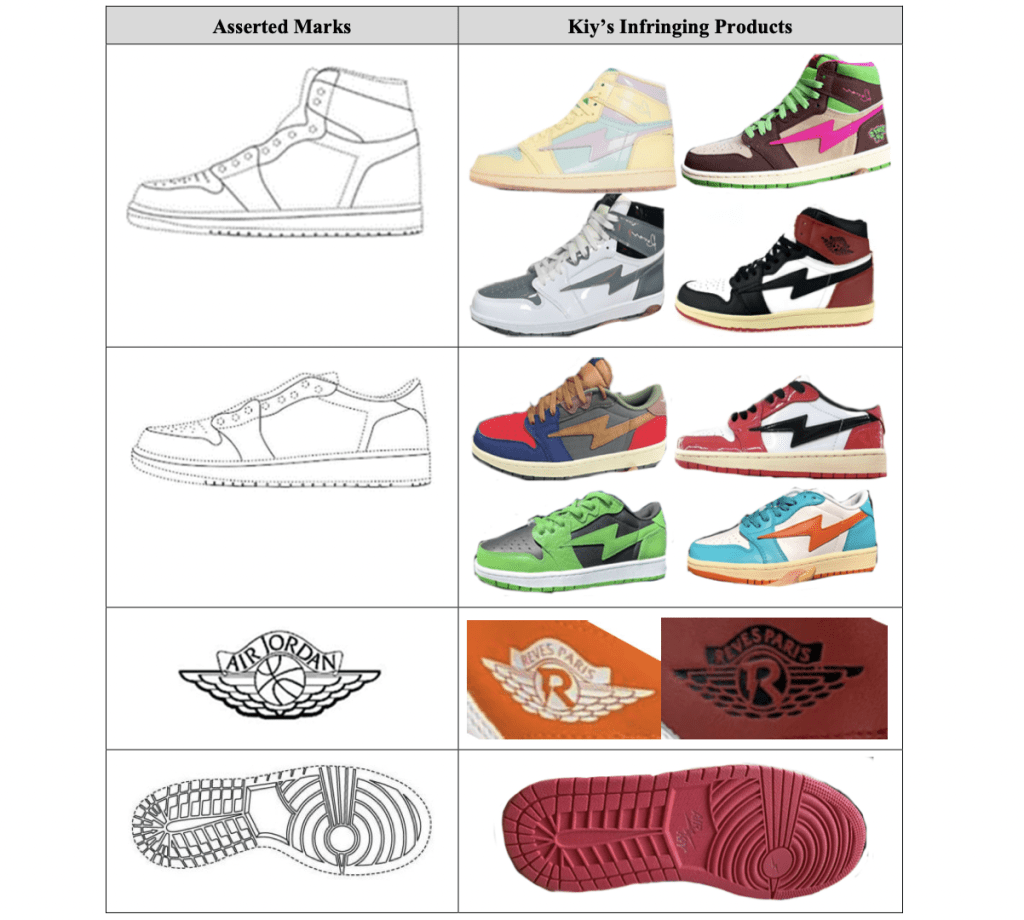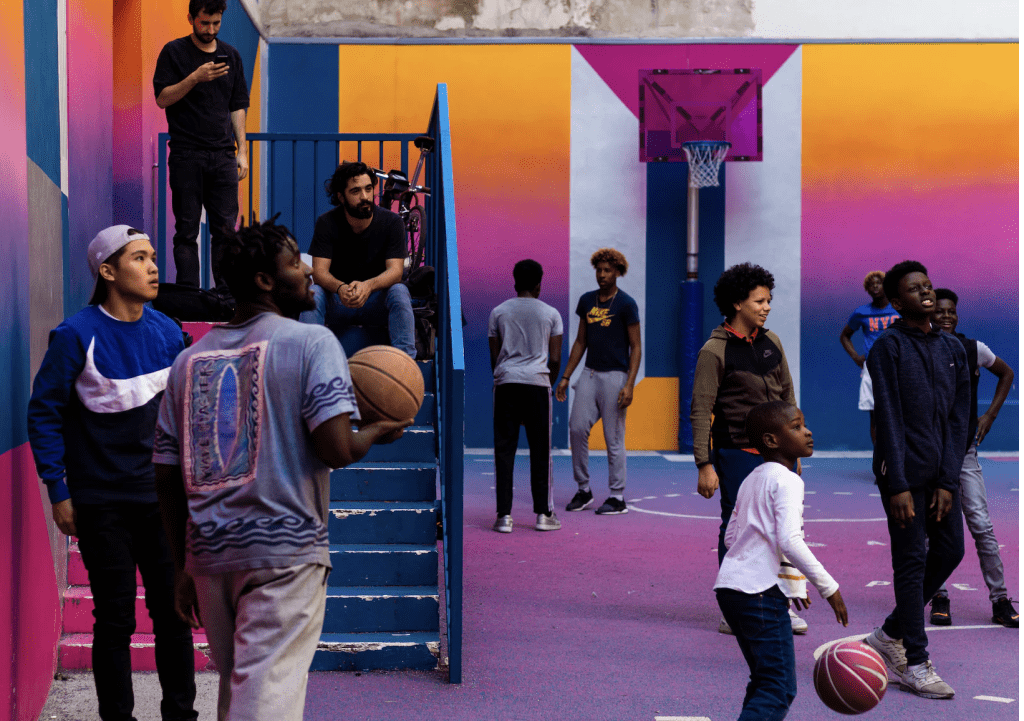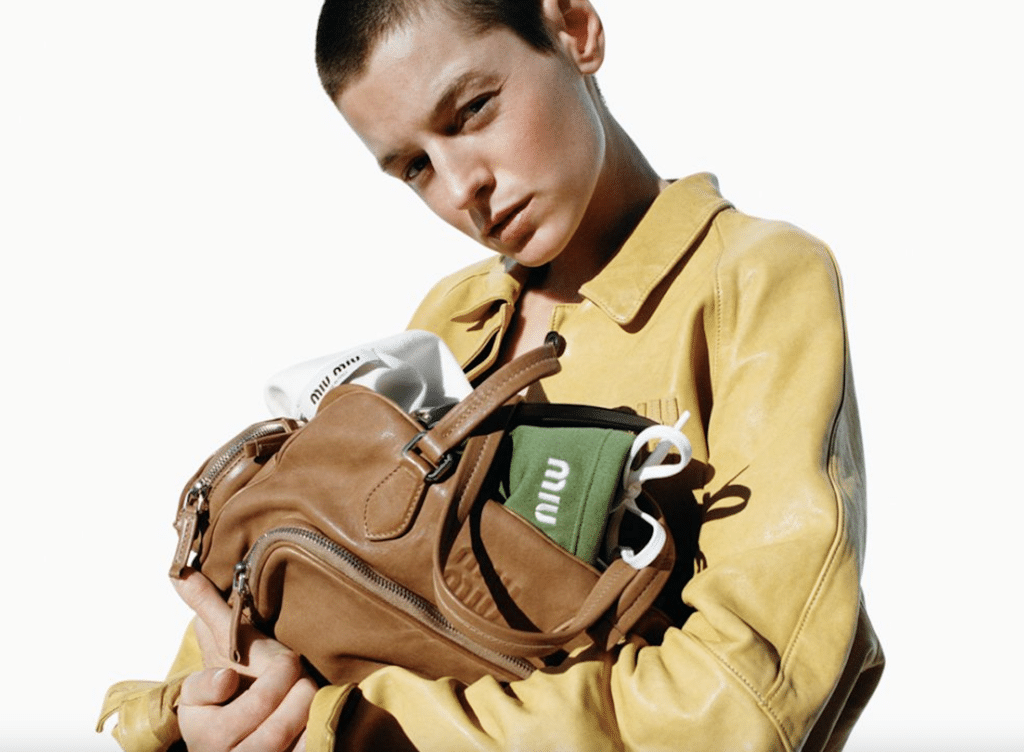A sneaker brand that recently landed on the recieveing end of a Nike-initiated trademark infringement and dilution lawsuit is pushing back against the sportswear behemoth by way of a newly filed answer and counterclaims. In its February 13 filing, By Kiy denies the bulk of Nike’s claims, asserting that, among other things, it has not infringed Nike’s Air Jordan 1 and Dunk trade dress by making and selling its own footwear offerings, including the “Air Kiy” and “Air Reves,” and “Air Omi” styles, which Nike alleged in its November 2022 complaint are “near-verbatim replicas” of its famed footwear and have “led to initial interest confusion, post-sale confusion, and confusion [among consumers] in the secondary market.”
In response to Nike’s claims, including that the two companies’ sneakers “travel in identical channels of trade and are sold to identical consumers,” who are “likely to believe that [By Kiy’s] infringing products are associated with and/or approved by Nike, when they are not,” By Kiy asserts that there is “no credible argument that there is any confusion in the marketplace about By Kiy’s shoes – they are known to be By Kiys and to not be Nikes.” Specifically, the New Jersey-based defendant contends that its shoes are: (1) “a different type of product than the athletic shoes Nike sells … more a form of commercial art than shoes to be used for basketball and other sports;” (2) “much more expensive than a typical Nike shoe; and (3) sold through “completely different channels of commerce than Nike’s shoes, including By Kiy-branded pop-up stores … and through a By Kiy-branded ‘drop app.’”
“There is no conceivable way that any reasonable consumer would think he or she is buying a Nike product when the consumer buys a By Kiy product, whether in the primary or secondary sales markets,” the company states, noting that all of its offerings are “prominently emblazoned with By Kiy’s name and distinctive ‘Lighting Bolt’ design.” (By Kiy goes further here, saying that its brand is “famous in its own right”and the lighting bolt logo is “distinctive in its own right.”)

In addition to trying to clearly situate its offerings as existing in a different segment of the market than Nike’s wares (and thus, portraying itself as a party that does not directly compete with Nike), which will inevitably play a large role in By Kiy’s defense to Nike’s trademark claims, By Kiy takes issue with the trademarks at the heart of Nike’s claims – its Air Jordan 1 and Dunk trade dress. In furtherance of its four invalidation counterclaims, By Kiy claims that Air Jordan 1 and Dunk trade dress are “essentially generic aspects of shoe designs … [that] are not protectible under the trademark laws.”
“Generic” Marks
Taking issue with four Nike trademark registrations (Nos. 3,711,305; 3,721,064; 6,368,694; and 6,368,691), which extend to the overall design of the Air Jordan 1 and Dunk sneakers, counsel for By Kiy argues that the registrations “are invalid and unenforceable as a matter of law because the purported trade dress embodied by the registrations consists entirely of functional, non-distinctive features, some of which may have potentially been patentable once upon a time (ending in the 1980s) but were never timely patented, and cannot be validly trademarked.” In short: the defendant claims that “each of the ‘marks’ depicted and described in [Nike’s] trade dress registrations are not ‘trademarks’ within the meaning of 15 U.S.C. §1127 … but rather features or functional designs of goods.”
On this front, By Kiy states that “it is hard to imagine that the characteristics reflected in [Nike’s] trade dress registrations” – which extend to things like “the stitching on the exterior of the shoe; the material panels that form the exterior of the shoe; the panel on top of the shoe that encompasses the eyelets for shoe laces; the vertical ridge pattern on the sides of the sole of the shoe,” etc. – would “even be noticeable to any consumer, let alone as something sufficiently recognizable and distinctive to qualify as protectible trade dress.” After all, counsel for By Kiy maintains that “there are two big ‘Swoosh’ marks on the sides of each Dunk shoe that tends to overwhelm the observability of the purported ‘marks’ in the trade dress registrations for the side of the shoes.”
in addition to alleging that Nike’s trade dress consists of “decades-old, never-registered potentially patentable characteristics of products masquerading as trademarks,” By Kiy attempts to chip away at Nike’s trademark rights by alleging that the Beaverton, Oregon-headquartered titan has done “very little to police” the aforementioned trademarks. In particular, By Kiy points to sneakers from Amiri, Rhude, Golden Goose, and Saint Laurent that “incorporate many, if not all, of the purported trade dress elements” of its Air Jordan 1 and/or Dunk trade dress, but that Nike has allegedly never claimed were infringing. Additionally, counsel for Biy Kiy cites Nike’s recent case against BAPE, which “manufactures and sells no less than six sneaker silhouettes that are identical to Nike sneaker silhouettes covered by Nike’s purported trademark registrations,” as evidence of Nike’s “inaction.”
Interestingly, while Nike may not actively police its marks, per By Kiy, the defendant argues that Nike “has a history of aggressive trademark litigation like this case,” and utilizes a strategy aimed at “quash[ing] competition and intimidat[ing] legitimate businesses, including small American designers that often lack the resources to defend themselves against such a well-resourced opponent as Nike.” With such litigiousness in mind, and in light of Nike allegedly “assert[ing] rights based on registered trademarks that it knows are of questionable validity,” By Kiy claims that “Nike increasingly acts as a ‘trademark troll.’”
With all of that out of the way, By Kiy sets out its counterclaims, in which it is seeking declarations from the court that the four Nike trademark registrations at issue are “invalid and unenforceable as a matter of law” on the basis that the designs at issue are functional “because such trade dress elements are essential to the use and purpose of the shoe and/or affect the cost, quality, performance, durability, and safety of the shoe” and/or are “patentable aspects … that are in the public domain.” The defendant is also seeking a finding that this is “an exceptional case and order that Nike be required to pay to By Kiy the costs of this action and By Kiy’s reasonable attorneys’ fees.”
The case is Nike, Inc. v. By Kiy LLC et al, 1:22-cv-10176 (SDNY).











